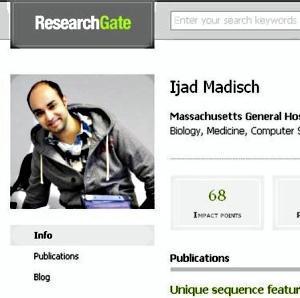Social networks like Facebook allow users to keep in up with their friends. Now, a social network for scientists hopes to use the technology to speed up scientific progress.

As he worked on a medical imaging experiment a few years ago, Harvard researcher Ijad Madisch kept running into problems. It could have been the algorithms he was using or the way he set up the experiment, something wasn't quite right.
"These are the small things, which in science, you know, cost you a lot of time," says Madisch.
His advisor didn't know why the experiment wasn't working. Nobody in his lab worked on the same stuff and none of his researcher friends could help.
"I was so frustrated. I said there has to be something online where I go, where people can present themselves as a scientist, and where they put their information about their research and their publications and you can search for it."
That's when Madisch got the idea for a social network for scientists, like Facebook, but with a more serious mission. The web platform would be a place for researchers to connect with each other and share best practices and information about their work that doesn't get published. Madisch saw his idea - which he named ResearchGate - as a tool to make scientists more productive.
"My goal: to win the Nobel Prize. And I really believe in that. If we think that ResearchGate will accelerate research in all the different fields, it will change the speed of science significantly in the future," says Madisch. "I definitely think that ResearchGate could win the Nobel Prize for that one day."
That big idea wowed investors. ResearchGate received funding from a former Facebook executive and the same venture capital firm that backed Twitter. So far, 900,000 people have signed up to be members.
One of them is Caroline Moore-Kochlacs, who is logging onto the website at her Boston University office. Her profile page shows her picture, her field - neuroscience - her doctoral advisor and publications. She can follow other researchers, or click onto group pages that discuss specific topics.
"Let's see what's going on in the computational neuroscience group today." Moore-Kochlacs uses Facebook too, but says people on that site feel like they have to be clever or stick to ordinary topics. "What's the best camera to buy? I'm going on a vacation. They're never anything to do with science."
Moore-Kochlacs likes ResearchGate because she can ask obscure questions about algorithms or what reagent to use in a certain chemical reaction. She can also find out what labs are working on before they publish and catch up with recent publications.
"The scientific literature is so huge at this point, that it's really impossible to get through everything in your topic area. People really rely on hearing it from other people," she says.
But not everyone ResearchGate user is pleased with the networking.
"I'm not really seeing the value of this," says Kim Bertrand, an epidemiologist at the Harvard School of Public Health. "Sometimes I get these e-mails that are like, 'Dear Sirs: I'm writing a dissertation on public health. Any suggestions? Please advise.' I don't need that."
Bertand signed up for ResearchGate when a colleague suggested it but says she's content so far with her own offline network of fellow researchers and advisors.
ResearchGate founder Madisch knows his site will only prove valuable if scientists use it to help each other. And, if it develops into the indispensable social network for scientists he hopes it will, he'll have made more of a contribution to science than he ever could as a lone researcher.
algorithm: a set of rules that must be followed when solving a particular problem 算法;计算程序
(来源:VOA 编辑:崔旭燕)
